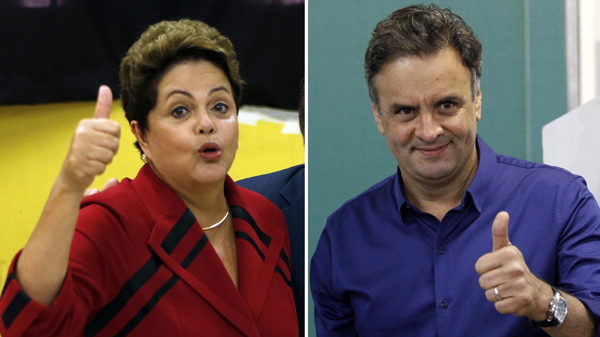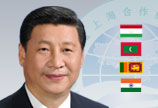Brazil's Rousseff to face Neves in rival in runoff
(Agencies) Updated: 2014-10-06 10:04
|
 A combination photo shows presidential candidates President Dilma Rousseff (L) of the Workers' Party and Aecio Neves of the Brazilian Social Democracy Party gesturing to photographers after voting at their respective voting stations in Porto Alegre (L) and Belo Horizonte, October 5, 2014.[Photo/Agencies]
|
RIO DE JANEIRO - Brazil's leftist President Dilma Rousseff placed first in Sunday's election but did not get enough votes to avoid a runoff and will face pro-business rival Aecio Neves, who made a dramatic late surge to finish a strong second.
After Brazil's most volatile campaign in decades, which saw one candidate die in a plane crash and another soar into first place only to collapse at the end, the result ended up being what was expected a year ago - a showdown between two arch-rival parties that have governed the country for the last 20 years.
Rousseff will spend the next three weeks fending off an energized Neves, a senator and darling of the investor community who blames her interventionist policies for a long economic slump and proposes free trade and tighter government spending.
Rousseff remains a slight favorite to win, due to her party's strong record of reducing poverty and creating jobs throughout its 12 years in power.
Seeking a second four-year term, she will also try to exploit a widespread perception that Neves' centrist Brazilian Social Democracy Party (PSDB), which governed from 1995 to 2002, is beholden to the rich.
In a speech on Sunday night, Rousseff wasted no time lashing out at the PSDB as the party of "recession, spending cuts and unemployment."
"The Brazilian people don't want ghosts from the past," she said in a hoarse voice.
With 99.9 percent of votes counted, Rousseff led with 41.6 percent support compared to 33.6 percent for Neves.
Marina Silva, a prominent environmentalist who had recently led opinion polls but wilted in the final days under a barrage of negative TV ads and doubts about her shifting positions on issues, came in third place with just 21.3 percent of votes.
That provided Neves, a popular two-term state governor and the grandson of a beloved politician from the 1980s, a window to present himself as a more reliable alternative.
Still, he immediately set out to woo Silva's voters, who will be critical to deciding the Oct. 26 runoff.
At a raucous celebratory speech, he paused to remember the Brazilian Socialist Party's original presidential candidate, Eduardo Campos, who died in a plane crash on Aug. 13, prompting Silva to take his place. He also pointed out that combining his votes with hers would lead to victory.
"This feeling of change that is widely present in all of Brazil was already victorious in the first round," Neves said.
Nearly 60 percent of Silva voters said in polls last week they would throw their support behind Neves if he made it into the runoff.
But others who were drawn to Silva's more leftist past will be hesitant to support the PSDB, which implemented important but unpopular pro-market reforms when it ran Brazil from 1995 to 2002.
A nationwide poll by Datafolha released on Saturday showed that, in a runoff, Rousseff would lead Neves by a margin of 48 percent to 42 percent. Still, Neves did much better than expected on Sunday and is within striking distance.
When Silva finished third in the 2010 election, she remained neutral. She did not show her cards in her concession speech on Sunday, saying only that members of her coalition would hold meetings in coming days to discuss any endorsements.










